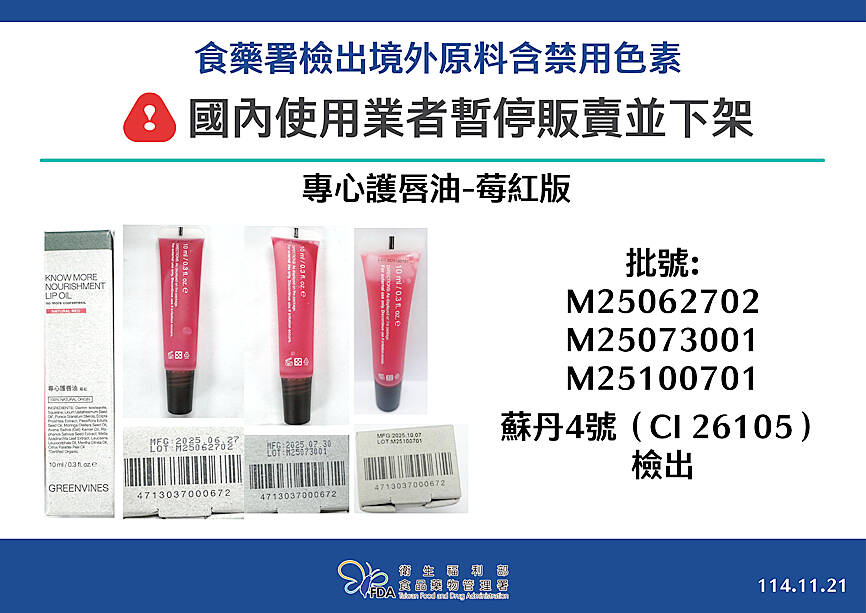Taiwan has detected banned Sudan red dyes in cosmetics for the first time, prompting 14 local and foreign companies to recall affected products and suspend their sales.
The Food and Drug Administration (FDA) on Friday said it learned late last month that some Chinese-made cosmetics might contain the banned dyes, tracing them to the source, raw materials supplied by Singapore-based Campo Research Pte Ltd.
Dermatologists warned that the dyes are potentially carcinogenic. Accidental ingestion from lip products poses the highest risk, though external-use cosmetics should not contain banned substances.

Photo courtesy of the Food and Drug Administration
On Nov. 4, the FDA notified domestic manufacturers and importers to check raw material sources and step up quality control, while it began random checks of suspected Chinese products from online platforms.
Similar contamination was later confirmed in a makeup remover by Chinese company Kimtrue and in a lip oil by Taiwanese company Greenvines. Both companies ordered the removal of their products from sales platforms immediately.
On Wednesday, the FDA inspected Taiwanese importer Eho Co and seized five batches of raw materials from Campo Research, three of which were confirmed the next day to contain Sudan IV.
The contaminated materials had been distributed to 14 companies, including Shanghai Li Rou Economic Development Co, O’right Inc and Greenvines, according to the agency.
The FDA has since required all affected companies to complete a self-inspection within 48 hours, report products using the problematic raw materials, and remove them from sale until safety is confirmed.
Under the Cosmetic Hygiene and Safety Act (化妝品衛生安全管理法), using banned dyes can result in fines ranging from NT$20,000 to NT$5 million (US$636 to US$159,083). Products found non-compliant must be recalled and destroyed.

Chinese spouse and influencer Guan Guan’s (關關) residency permit has been revoked for repeatedly posting pro-China videos that threaten national security, the National Immigration Agency confirmed today. Guan Guan has said many controversial statements in her videos posted to Douyin (抖音), including “the red flag will soon be painted all over Taiwan” and “Taiwan is an inseparable part of China,” and expressing hope for expedited reunification. The agency last year received multiple reports alleging that Guan Guan had advocated for armed reunification. After verifying the reports, the agency last month issued a notice requiring her to appear and explain her actions. Guan

GIVE AND TAKE: Blood demand continues to rise each year, while fewer young donors are available due to the nation’s falling birthrate, a doctor said Blood donors can redeem points earned from donations to obtain limited edition Formosan black bear travel mugs, the Kaohsiung Blood Center said yesterday, as it announced a goal of stocking 20,000 units of blood prior to the Lunar New Year. The last month of the lunar year is National Blood Donation Month, when local centers seek to stockpile blood for use during the Lunar New Year holiday. The blood demand in southern Taiwan — including Tainan and Kaohsiung, as well as Chiayi, Pingtung, Penghu and Taitung counties — is about 2,000 units per day, the center said. The donation campaign aims to boost

The Kaohsiung Tourism Bureau audited six hotels in an effort to prevent price gouging ahead of Korean band BTS’ concert tour in the city scheduled for Nov. 19, 21 and 22 this year. The bureau on Friday said that the audits — conducted in response to allegations of unfair pricing posted on social media — found no wrongdoing. These establishments included the local branches of Chateau de Chine, Hotel Nikko, My Humble House, and Grand Hai Lai, it said, adding that the Consumer Protection Commission would have penalized price gougers had the accusations been substantiated. The bureau said the Tourism Development Act

The Central Weather Administration (CWA) said a magnitude 4.9 earthquake that struck off the coast of eastern Taiwan yesterday was an independent event and part of a stress-adjustment process. The earthquake occurred at 4:47pm, with its epicenter at sea about 45.4km south of Yilan County Hall at a depth of 5.9km, the CWA said. The quake's intensity, which gauges the actual effects of a temblor, was highest in several townships in Yilan and neighboring Hualien County, where it measured 4 on Taiwan's seven-tier intensity scale, the CWA said. Lin Po-yu (林柏佑), a division chief at the CWA's Seismological Center, told a news conference